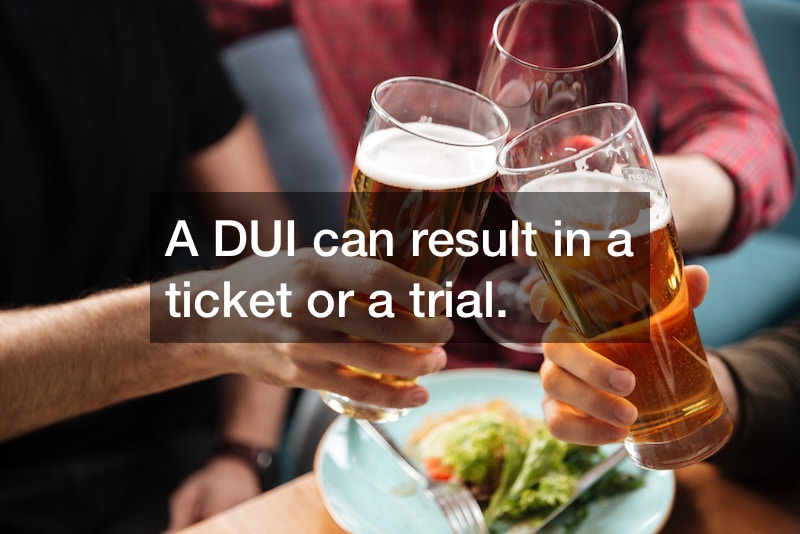Being faced with a DUI charge is something that no driver wants to encounter. If you’ve been charged with driving under the influence, also known as a “DUI,” you might think that your life is over and worry about losing your license, your financial security, or even being locked up in jail. Before you panic over this kind of charge, you should consult with a DUI law firm right away. Whether you’ve already received a DUI citation or suspicion of driving under the influence, or you know that getting a DUI charge is a possibility based on an encounter with law enforcement, “lawyering up” is a decision you’re sure not to regret in the future.

For most folks who’ve never had a DUI conviction, a first conviction for a dui will result in a fine or similar consequence. After all, in many states, a first DWI offense is punishable by a fine. Depending on where you live and where the DUI took place, you might have other potential options for your sentencing. A skilled attorney will help you understand your options and advocate for the most favorable outcome. Still confused about what to do first? We’ve got you covered. Read on to learn more.

Drunk driving is a concerning crime that can make you face jail and other consequences. However, you might wonder, when will you be excused for driving under the influence? And the answer might depend on your state laws and your case. Moreover, DWI case law procedures are complicated, and you might need the help of a DWI lawyer to understand your position.
A suspected DUI case can end in a ticket or going to trial. It all depends on the circumstances and how you behave during the procedure. Moreover, these legal procedures can be too much for some people. If you think you can’t handle the trials and tribulations of a DUI case, you need a team of DWI lawyers to advocate for you. Questions such as “What does 3 counts of DUI mean?” can finally have their answers by having a lawyer consult all your questions.
Avoid going to jail or facing false accusations, and get a DUI lawyer to defend your case and find evidence that proves your innocence. Contact us for more information about DUI law.
The United States is a nation of cars, and a majority of Americans own a valid driver’s license. Most of them are safe and responsible drivers when they operate their private cars or commercial trucks, as traffic accidents are not to be desired. However, some drivers are impaired behind the wheel, and they are a serious danger to themselves and to anyone around them. Some drivers have drugs or alcohol in their systems, which is a serious crime in itself even if no car accidents occur. Drunk driving is tragically common today, so police officers are always on the lookout for impaired drivers (typically, their erratic and sloppy driving will give them away). Someone who is charged with DUI may turn to criminal defense law firms and might arrange to have a car breathalyzer device installed, along with ignition interlock devices. The convict may have ignition interlock device questions, and get answers to those ignition interlock device questions on how to use the hardware installed in their car.
Driving Drunk
What makes for drunk driving? As the law sees it, a motor vehicle’s operator is driving drunk if that person has a blood alcohol content (BAC) of 0.08% or higher, although some states have a threshold even lower than that. Someone with alcohol in their system has impaired coordination, judgment, and reflexes, and this means that they may speed, run red lights or stop signs, and most of all, hit other cars, pedestrians, or property. This can easily cause injury cases or even wrongful death to anyone involved, not to mention damage to other cars or public property. Some Americans believe that it’s acceptable to drive “buzzed” instead, but this is not true at all. Anyone with any drugs or alcohol in their system is not fit to drive.
It may also be noted that driving drunk is a serious crime even if no crash or injuries even occurred. A police officer, as mentioned earlier, may spot a drunk driver based on that driver’s erratic and sloppy driving, and pull them over to administer tests. And if a crash does occur, police officers and/or medical teams might administer tests to all drivers involved for alcohol. It is possible for someone to face not only DUI charges, but charges for property damage or causing a wrongful death. In cases like these and more, the accused will almost certainly want to hire a criminal defense lawyer.
The Court Case
Someone facing DUI charges, especially if it’s not their first time, will want to turn to local criminal defense law firms for help. Some such law firms specialize in DUI cases in particular, and a client may get consultations with the attorneys who work there (this may or may not incur a fee). The accused may then hire a lawyer whose skills, experience, and success rate are to their liking, and build a case together.
Nothing is being guaranteed here, but if an accused has a lawyer representing them in court, that accused may get a lighter sentence. Their lawyer may argue to have some charges dropped or changed to lesser ones, and this and other legal work might result in a lighter sentence. The accused might stand a better chance of this if no injuries or accidents took place during the DUI incident. One possible outcome is that rather than jail time or a driver’s license suspension, the convict may have a breathalyzer and ignition interlock device installed in their car.
Someone new to this concept might have ignition interlock device questions, and they might direct those ignition interlock device questions to the court or the company that made or installed the hardware. The convict may be told that it’s a serious crime in most cases to tamper with or remove the breathalyzer or ignition interlock device, and the convict may be shown how to use it properly.
Before turning on the car, the driver must submit a breath sample, and if it is clean, the car may turn on. During driving, further samples must be submitted, and the breathalyzer will alert the driver ahead of time so they can pull over safely first. And of course, a failed test means that the car can’t even be turned on.

